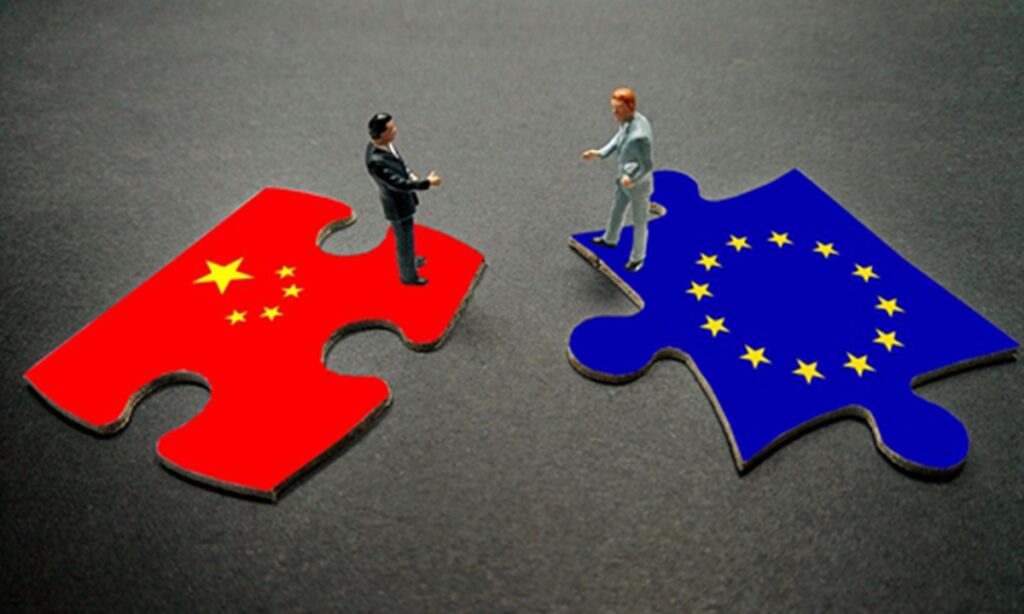Ahead of the scheduled seventh China-Germany inter-governmental consultation, both Wang Yi, director of the Office of the Foreign Affairs Commission of the Communist Party of China (CPC) Central Committee, and Chinese State Councilor and Foreign Minister Qin Gang met with Jens Plotner, foreign and security policy advisor to German chancellor, on Wednesday in Beijing, where preparations for the consultation were the focus.
As the first event of its kind in the post-pandemic era, and also the first since German Chancellor Olaf Scholz took office, the consultation will be of great significance for China-Germany relations, represent a high level of cooperation between the two countries, and is expected to help Berlin adopt a more rational China approach, according to Chinese observers.
Wang Yi, also a member of the Political Bureau of the CPC Central Committee, said that in the face of increasing instability and uncertainties in the international situation, China and Germany should work together to make the seventh China-Germany inter-governmental consultation a success and send a positive signal to Europe and the world, according to the Xinhua News Agency.
“We are full of expectations for the upcoming round of inter-governmental consultations between the two countries and will work together to speed up the preparatory work,” Plotner said.
Separately, Qin Gang and Plotner also had in-depth communications on preparations for the seventh round of inter-governmental consultations between the two countries, Xinhua reported.
Two years after the last consultation, both sides are expected to reestablish and improve some long-term cooperation goals, as well as solve problems or bridge differences in cooperation according to their respective circumstances and changes, Cui Hongjian, director of the Department of European Studies at the China Institute of International Studies, told the Global Times on Thursday.
Practical cooperation in traditional economic and trade sectors including automobiles and chemicals, and those in emerging industries like green and digital fields, are expected to be expanded through the upcoming consultation, the observer believes.
During the consultation, it should be emphasized that the interdependent and mutually beneficial economic and trade relations serve the interests of both sides, the observer stressed. He noted that the narratives of “decoupling” or “de-risking” advocated by some forces in the US should not be applied to the business cooperation between China and Germany.
Last week, the roll-out of the new strategy for Germany in its dealings with China was delayed due to policy differences within the government, and will not be in place in time for the consultation on June 20, three sources were quoted as saying by Reuters.
This may be good news, as it means it will be easier for the Chinese and German governments to carry out effective and candid exchanges at the upcoming consultation, and in turn, through pragmatic consultation, Germany could boost its confidence in further strengthening cooperation with China while preventing its China strategy from being dominated by a few departments and forces, according to Cui.
At the same time, it should be noted that after Scholz came into office, some changes in Germany’s policy orientation, public opinion and environment – such as the Ukraine crisis and tense China-US relations – have indeed had some impact on Berlin’s understanding of China, and the major European power, which once played a leading role in China-EU relations, is now more of a follower of the EU’s China policy, Cui pointed out.
Observers stressed that although Germany and some other European countries are allies of the US, they should understand that amid the uncertainties and changes taking place in the world, the relationship between great powers cannot be simply defined as that of “friend or foe.”
Cui said Europe and the US have always had differences, but the US always tries to find third parties to transfer these contradictions to. But under such an approach, some differences and problems between Europe and the US, instead of being solved, are instead expanded, which has led Europe to say no to the US on certain issues.
Germany and Europe should be more independent in their policymaking and make a choice that will truly benefit them, Cui said.
(Global Times)



